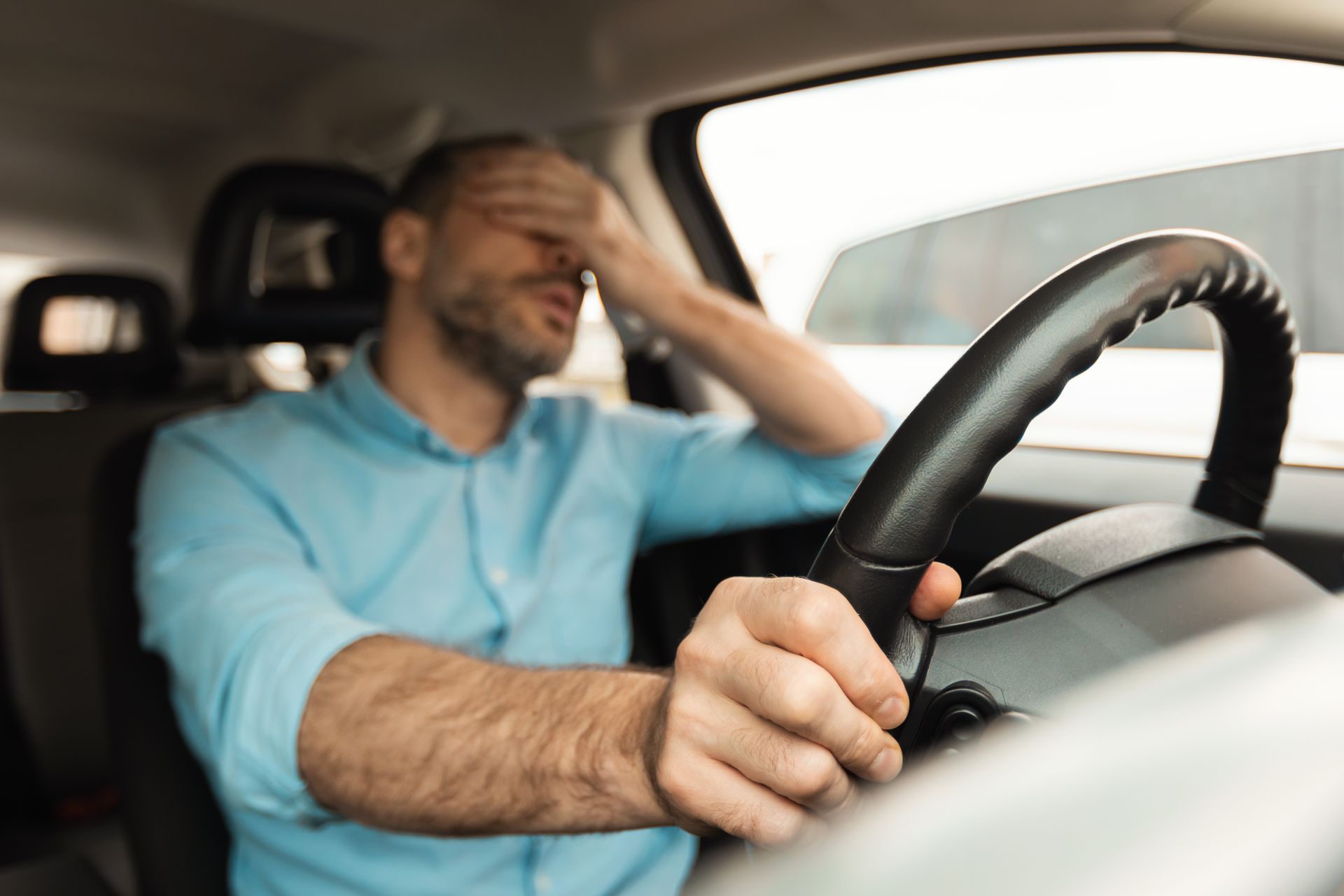Don't Call Christina Later, Call Christina Now
Follow us
How Do I Manage Driving Fatigue and Stay Alert on the Road?
Tips for Staying Safe Behind the Wheel and
Preventing Fatigue-Related Accidents
Driving fatigue is one of the most overlooked yet dangerous risks on the road. It affects thousands of drivers every year, leading to accidents that could have been avoided. Fatigue can impair reaction times, concentration, and decision-making, much like alcohol or drugs. Knowing how to manage fatigue and stay alert is essential for every driver. In this blog, we’ll discuss the causes of driving fatigue, signs to watch for, and practical tips for staying alert and safe while driving.
Why Driving Fatigue Is a Serious Concern
According to the National Highway Traffic Safety Administration (NHTSA), drowsy driving causes thousands of accidents annually. In fact, it is estimated that one in five crashes involves a fatigued driver. Driving while fatigued can lead to slower reflexes, reduced awareness, and even falling asleep at the wheel. When you’re tired, your body and mind struggle to stay focused, making you more likely to miss important signs or react too slowly.
What Causes Driving Fatigue?
There are several factors that contribute to driving fatigue. Understanding these can help you take proactive steps to prevent it. Some common causes include:
- Lack of Sleep: The most obvious cause of driving fatigue is not getting enough sleep. Most adults need at least 7-9 hours of sleep each night to function at their best.
- Long Hours on the Road: Long-distance driving, especially when you’ve been behind the wheel for hours without a break, can quickly lead to exhaustion.
- Boredom: Driving on monotonous, long roads without much change in scenery can lead to drowsiness. Your brain can start to shut down when it doesn’t have any stimulation.
- Medications and Health Conditions: Some medications can cause drowsiness as a side effect. Health conditions like sleep apnea or narcolepsy can also increase the risk of fatigue while driving.
- Time of Day: Our bodies have natural sleep rhythms, and driving during times when we would typically be asleep (like late at night or early in the morning) increases the risk of fatigue.
What Causes Driving Fatigue?
There are several factors that contribute to driving fatigue. Understanding these can help you take proactive steps to prevent it. Some common causes include:
- Lack of Sleep: The most obvious cause of driving fatigue is not getting enough sleep. Most adults need at least 7-9 hours of sleep each night to function at their best.
- Long Hours on the Road: Long-distance driving, especially when you’ve been behind the wheel for hours without a break, can quickly lead to exhaustion.
- Boredom: Driving on monotonous, long roads without much change in scenery can lead to drowsiness. Your brain can start to shut down when it doesn’t have any stimulation.
- Medications and Health Conditions: Some medications can cause drowsiness as a side effect. Health conditions like sleep apnea or narcolepsy can also increase the risk of fatigue while driving.
- Time of Day: Our bodies have natural sleep rhythms, and driving during times when we would typically be asleep (like late at night or early in the morning) increases the risk of fatigue.

Who is Most Prone to Driving Fatigue?
Driving fatigue can affect anyone, but certain groups of people are more prone to it due to various factors. Here's a breakdown:
Long-Distance Drivers
- Who: Truck drivers, delivery drivers, long-haul commuters, and anyone who spends extended hours on the road.
- Why: Long driving hours with few breaks contribute to tiredness, especially during night shifts or early morning hours.
Shift Workers
- Who: People who work irregular hours, including night shifts or rotating shifts.
- Why: Disruptions to the body’s natural circadian rhythm can result in tiredness, especially when driving after a long or irregular shift.
Drivers with Sleep Disorders
- Who: People with conditions like sleep apnea, insomnia, or narcolepsy.
- Why: These conditions interfere with restful sleep, making it difficult to stay alert behind the wheel.
Young Drivers
- Who: Teenagers and young adults, particularly those who lack driving experience.
- Why: They may be more prone to risky behavior, driving late at night, or not recognizing when they're too tired to drive.
Older Drivers
- Who: Older adults, especially those over the age of 65.
- Why: Aging can affect alertness and reaction time, leading to increased fatigue during driving.
Drivers on Medication
- Who: People who take medications, especially those with sedative effects, such as antihistamines, painkillers, or antidepressants.
- Why: Medications can make drivers drowsy and reduce their focus on the road.
Drivers Who Skimp on Sleep
- Who: Anyone who consistently gets less than the recommended 7-9 hours of sleep per night.
- Why: A lack of sleep makes it harder for the brain to focus and stay alert, increasing the chances of fatigue.
Busy Parents and Caregivers
- Who: Parents, caregivers, and those responsible for young children or elderly family members.
- Why: Busy schedules, lack of sleep, and managing multiple responsibilities can leave these individuals more prone to driving fatigue.
By recognizing these at-risk groups, we can take proactive measures to reduce fatigue and stay safe on the road.
Who is Most Prone to Driving Fatigue?
Driving fatigue can affect anyone, but certain groups of people are more prone to it due to various factors. Here's a breakdown:
Long-Distance Drivers
- Who: Truck drivers, delivery drivers, long-haul commuters, and anyone who spends extended hours on the road.
- Why: Long driving hours with few breaks contribute to tiredness, especially during night shifts or early morning hours.
Shift Workers
- Who: People who work irregular hours, including night shifts or rotating shifts.
- Why: Disruptions to the body’s natural circadian rhythm can result in tiredness, especially when driving after a long or irregular shift.
Drivers with Sleep Disorders
- Who: People with conditions like sleep apnea, insomnia, or narcolepsy.
- Why: These conditions interfere with restful sleep, making it difficult to stay alert behind the wheel.
Young Drivers
- Who: Teenagers and young adults, particularly those who lack driving experience.
- Why: They may be more prone to risky behavior, driving late at night, or not recognizing when they're too tired to drive.
Older Drivers
- Who: Older adults, especially those over the age of 65.
- Why: Aging can affect alertness and reaction time, leading to increased fatigue during driving.
Drivers on Medication
- Who: People who take medications, especially those with sedative effects, such as antihistamines, painkillers, or antidepressants.
- Why: Medications can make drivers drowsy and reduce their focus on the road.
Drivers Who Skimp on Sleep
- Who: Anyone who consistently gets less than the recommended 7-9 hours of sleep per night.
- Why: A lack of sleep makes it harder for the brain to focus and stay alert, increasing the chances of fatigue.
Busy Parents and Caregivers
- Who: Parents, caregivers, and those responsible for young children or elderly family members.
- Why: Busy schedules, lack of sleep, and managing multiple responsibilities can leave these individuals more prone to driving fatigue.
By recognizing these at-risk groups, we can take proactive measures to reduce fatigue and stay safe on the road.

Signs of Fatigue While Driving
Recognizing the signs of fatigue early can help you avoid dangerous situations. Common signs include:
- Frequent yawning
- Difficulty focusing or keeping your eyes open
- Drifting between lanes or off the road
- Feeling irritable or restless
- Slower reaction times
- Nodding off or having trouble remembering the last few miles driven
If you notice any of these signs, it’s crucial to pull over and take a break. Driving while fatigued is just as dangerous, if not more so, than driving under the influence of alcohol.
How to Manage Driving Fatigue and Stay Alert
There are several strategies you can use to manage fatigue and stay alert while driving:
Get Enough Sleep Before You Drive
The best way to prevent fatigue while driving is to ensure you're well-rested before you get behind the wheel. Try to get 7-9 hours of sleep before a long trip. If you’re feeling tired before driving, consider postponing your journey or finding another way to get to your destination.
Take Regular Breaks
If you're driving for long periods, make sure to stop and rest every two hours or so. Stretching your legs, grabbing a snack, and taking a short walk can help refresh you. This is especially important on long road trips.
Stay Hydrated and Eat Healthy Snacks
Dehydration and poor nutrition can worsen fatigue. Drink plenty of water and eat small, healthy snacks to maintain your energy levels. Avoid heavy meals, especially foods high in sugar, as they can make you feel sluggish.
Avoid Driving at Night or When You’re Sleepy
Nighttime driving, or driving when you’re already tired, significantly increases your risk of falling asleep behind the wheel. If you feel sleepy, it's always best to pull over and take a nap. A quick 20-30 minute power nap can improve alertness without making you feel groggy.
Have a Travel Companion
If possible, travel with a passenger who can share the driving duties. Having someone else drive can give you a chance to rest, and they can also keep you engaged and help reduce boredom.
Use Caffeine Wisely
Caffeine can help boost your alertness, but it’s important not to rely on it. If you drink coffee or an energy drink, wait about 30 minutes to an hour for the caffeine to kick in before you get back on the road. Be cautious, as caffeine effects can wear off and lead to a crash in energy.
Stay Engaged
Engage with your surroundings and stay mentally active. If you’re driving alone, try listening to upbeat music or an interesting podcast to keep your mind engaged and prevent drowsiness.
Know When to Stop
If you notice any of the signs of fatigue, don’t push through. Find a safe place to pull over and rest. A few minutes of rest can save your life and the lives of others on the road.
Driving fatigue is a serious issue that should never be underestimated. It’s essential to understand the risks and take steps to ensure that you stay alert while behind the wheel. By getting enough rest, taking regular breaks, and staying hydrated, you can minimize your chances of fatigue-related accidents. Always be aware of the signs of fatigue and know when to stop. Your safety and the safety of others depend on it.
If you or someone you know has been involved in a car accident caused by fatigue or drowsy driving, contact us today for help.
We can guide you through the next steps and help you recover any damages or compensation you may be entitled to.
Stay safe on the road!

Share this blog with friends and family to raise awareness about the dangers of driving fatigue and how to stay alert on the road. Learn valuable tips to ensure you’re driving safely, protecting yourself and others from accidents caused by fatigue. Stay informed and make your next drive a safer one!
Quick & Reliable
We are available 24/7 to Guide You to Better Health.
CALL CHRISTINA NOW is here to help 24 hours a day, 7 days a week, offering free and compassionate support. When you call us, we'll listen to your concerns, understand the specifics of your accident, help you find medical care for your injuries, and connect you with a professional who can advise you on the legal aspects of your situation.
CALL CHRISTINA NOW specializes in assisting with Lawyer and Medical Accident matters. If you've been in a car, motorcycle, or truck accident—or any other kind of accident—contact us today for trustworthy support.
DISCLAIMER:
CALL CHISTINA NOW isn't a law firm and can't provide legal advice, but we can refer you to the right attorney who can.
All Rights Reserved | Call Christina Now
Copyright © Call Christina Now Offers All Rights Reserved 2025
View Our Privacy Policy | Terms & Conditions | Disclaimer